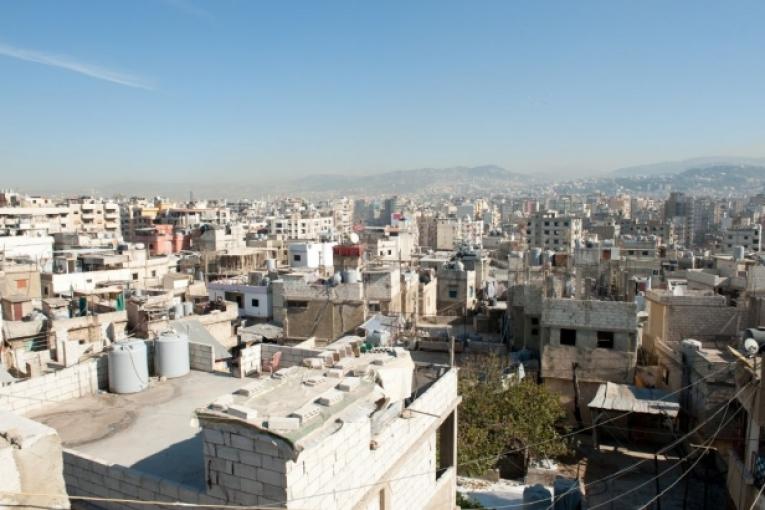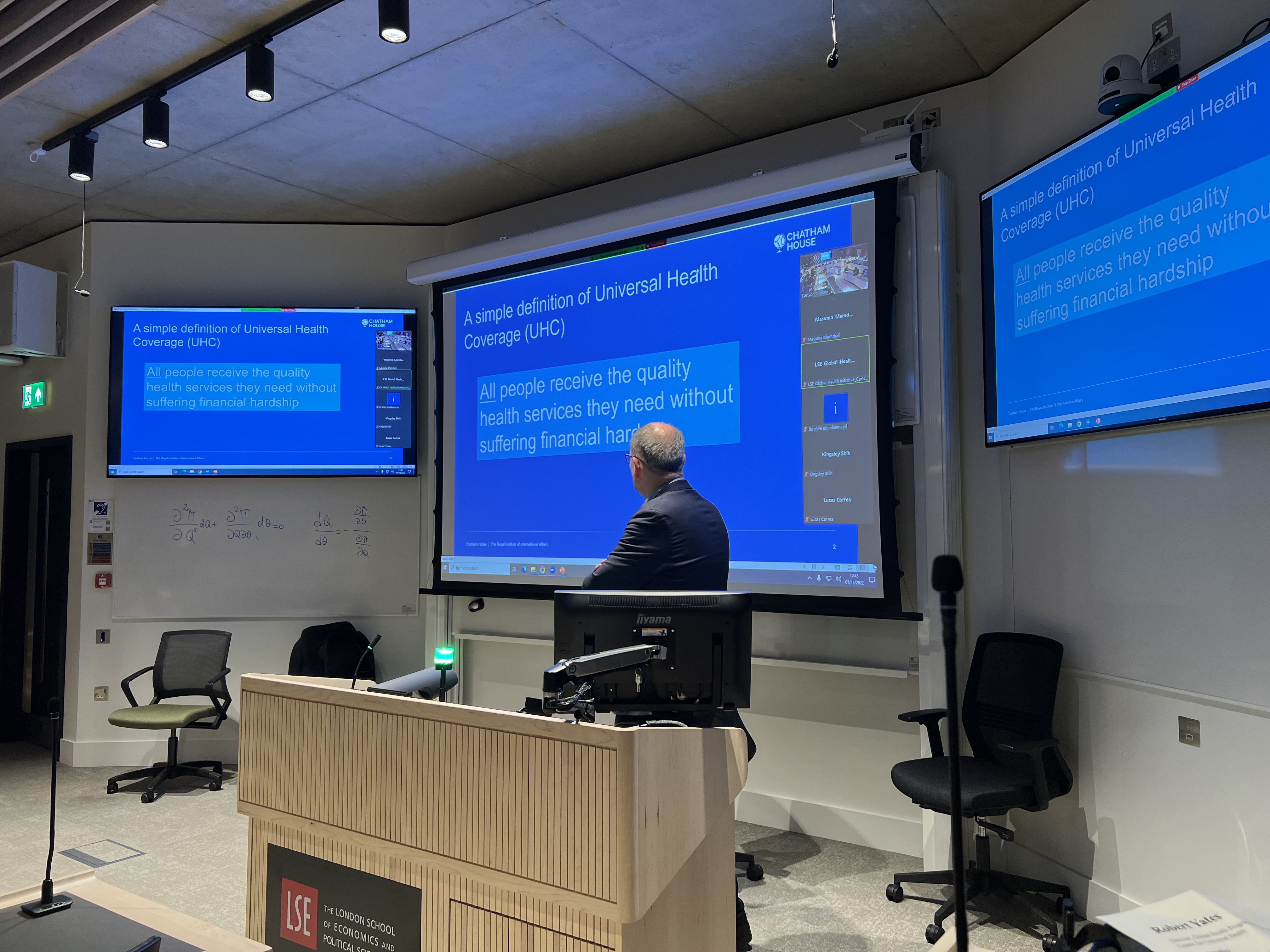Informative and exploratory discussions took place at the LSE-hosted event: Conflict and Mental Health on 13th February 2020. The event was co-organised by the Global Health Initiative and the Care Policy and Evaluation Centre. The event showcased the research interests of Simon Wessely, Daniela Fuhr and Gloria Wong, combined with the personal experience of Julia Nicholson.
Professor Sir Simon Wessely
Since 2003, Simon’s research group has run a large-scale cohort study exploring the physical and psychological health and wellbeing of 16,000 UK Armed Forces personnel, including regulars and reservists in the Royal Army, Navy and Air Force, both retired and still serving. Members of the armed forces in combat roles may be exposed to profound physical and psychological stresses. However, the social and mental health-related consequences are often vastly different to estimations by the public and in the media. Many people wrongly assume the rate of suicide to be higher amongst veterans – it is in fact only a third of the rate expected for the population, and reportedly high rates of homelessness quoted in the media have not been corroborated. The rate of PTSD amongst service personnel is 5% – significantly less than the public perception of 60% – and much lower than the 20% rate of Post-Traumatic Stress Disorder (PTSD) in civilians affected by acts of terrorism. However, PTSD rates do rise to 60% in those injured by friendly fire in combat.
There are socially protective effects of armed forces membership. Many people who join up have risk factors for interactions with the criminal justice system, such as social deprivation and unstable family circumstances, but the study demonstrates that the rate of criminal offending decreases in serving and former military personnel compared to the rate predicted from their backgrounds.
Not all outcomes are positive. Simon discussed how discrepancies between the estimated social and mental health-related outcomes of members of the armed forces presented to the public through the media can be self-fulfilling, with US veterans pitied and respected, but less likely to be employed or espoused. In the UK cohort studied, the commonest problem identified was the extent of alcohol misuse, which is five times more common in men and seven times more common in women in the Army and Navy groups compared to the general population.
Overall, military careers mitigate the social risks of a deprived background, but do not eliminate them. Efforts to screen combat personnel for their risk of adverse outcomes have not been adopted due to their very poor predictive value – they have proven wrong in 6 out of 7 cases, and to do so would therefore deny many people the potential benefits of their desired career.
Dr Daniela Fuhr
Daniela’s recent work has explored the mental health of Syrian refugees in neighbouring and distant countries. Her presentation informatively portrayed the mental health issues of Syrian refugees in Lebanon and the treatment gap observed through the STRENGTHS project (https://strengths-project.eu/en/strengths-home/). Refugees suffer a high prevalence of PTSD, anxiety and depression, as a result of pre-migration stressors (often persecution and poverty), traumatic experiences in transit, and post-migration stressors (discrimination and the uncertainty of the asylum process). Daniela explained the degree of fragmentation of the Lebanese health system between governments and other agencies, and the access challenges of Syrian refugees.
Shockingly, Daniela’s work in Turkey revealed that only 9% of refugees seek mental health care, commonly believing that they can handle these difficulties themselves, that they will get better in time without treatment, or that there is no effective treatment available. The STRENGTHS project seeks to provide a framework for scaling-up the delivery and uptake of Problem Management Plus, an evidence-based intervention effective for people suffering mild-moderate symptoms across multiple diagnoses. Case identification and stigma have been significant barriers – for example, 31% of refugees believed that those with a mental health problem should not get married.
Dr Gloria Wong
Gloria’s presentation explored youth mental health in Hong Kong in the context of the protests against the unpopular extradition bill. Demonstrations started in early 2019 as peaceful marches, but by June had escalated into violent clashes between protesters and the police force. The majority of protesters were young people, a group who even before the unrest had significant unmet mental health needs, with 54% self-reporting symptoms of anxiety and 69% of depression. The conflicts were associated with exposure to traumatic events including 7000 arrests, violent confrontation, and a case of self-immolation and public suicide, leading to concerns that other young people may copy these suicidal acts or develop PTSD from what they had witnessed. Even for those not present, young people were widely exposed to these traumatic images through social media, with depression and PTSD more common in those online for more than 2 hours a day.
Adding further complication, the protests were associated with increasing mistrust of the authorities, with some people not seeking help even for physical injury for fear they may be identified as dissenters. To help young people whose mental health has been affected by the escalating conflict, Gloria and her colleagues are working to set up new ‘Youth Mental Wellness Hubs” to create safe spaces inside youth centres (a non-stigmatising environment). These services are tailored to the needs of young people, including their preference for flexible and self-help services.
Despite the profoundly traumatic events taking place around the protests, some people experienced a sense of increased social unity and connectedness between generations, with tales of adults collecting younger people after protests whether known to them or not and driving them to safety.
Mrs Julie Nicholson
Julie, formerly a reverend, depicts her thoughts on the loss of her daughter, Jenny, to the 7/7 bombings in her book ‘A Song for Jenny’ , which subsequently became a BBC short-film in 2015.
During the event, Julie was kind enough to share her deeply moving account of the events around the devastating loss of Jenny. Julie discussed the degree of media interest causing loss from terrorism to be displayed in a very public forum, and the implications of grief from an atrocity committed in the name of faith. She highlighted the under-appreciated aspect of sibling grief, with brothers and sisters of those who died struggling to manage their own loss while supporting their parents and families. Julie recounted her difficulties in persuading professionals to give her the information and access she requested, while they attempted with misguided good intentions to protect her from the details of what had happened. She described families’ need for empowerment, and to be heard.
Themes from the event
The presentations and stories from the event demonstrated that experiences of conflict take many forms, from those of military personnel to refugees, citizens of social unrest, victims of terrorism and their families. As elsewhere in mental health care, stigma is a pervasive challenge, and can affect case identification, help-seeking, relationships and employment.
Although many of these events are rooted in the commonality of threat, violence, and loss, their effects differ by context and between individuals. Policymakers and service designers should not assume that all of those with mental health needs stemming from conflict have the same wants and needs – to do so could be at best ineffective and at worst harmful. It is crucial to engage with those affected for a more nuanced understanding of how best to support them.
Photo by Nishant Vyas from Pexels
The views, thoughts and opinions expressed in this blog post are those of the author(s) only, and do not reflect LSE’s or those of the LSE Global Health Initiative.





